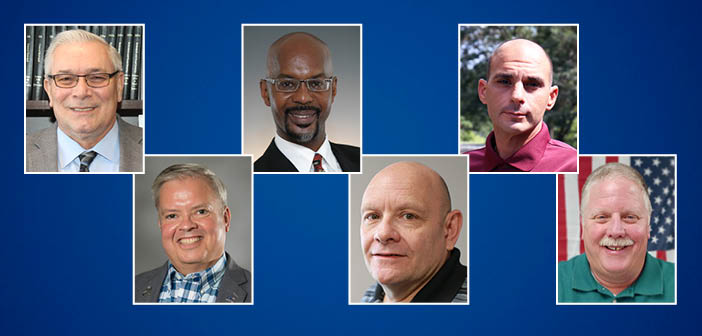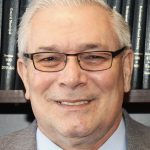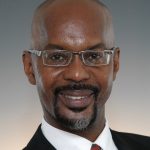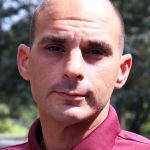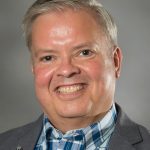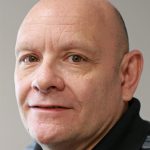Jerry Laricchiuta, Long Island Region President
COMMACK — CSEA Long Island Region President Jerry Laricchiuta has been a staunch advocate for working class people since he began his activist career in 1995 as a shop steward.
Since then, Laricchiuta has earned his political stripes by serving as the CSEA Long Island Region’s Executive Vice President, Nassau County Local President, Co-Chair of the CSEA Statewide Judicial Committee and other positions. Along the way, he has received numerous honors for his unionism, including CSEA’s Mission Achievement Award.
As he begins his largest role to date, Laricchiuta is looking forward to rolling up his proverbial sleeves and continuing his long history of activism.
Perhaps one of Laricchiuta’s biggest accomplishments is helping lead efforts against privatization at the Nassau County Correctional Center, where he worked as a cook. Aramark Corporation, a private sector supplier of food services, facilities and uniforms, was planning to take over the food services at the jail.
“The unit board and I started working with [Nassau County] legislators and we got them [legislators]to agree to two things,” said Laricchiuta. “They [legislators]agreed that they would never privatize the jail and we got legislation that says New York prisons, jails and support staff positions can never be privatized. We won, we beat the big guys.”
The Aramark victory is a legacy that Laricchiuta plans to continue in his role as Long Island Region President. Recognizing the magnitude of his new position, Laricchiuta is looking forward to learning more about his role.
“I know that being a region president is very different from being a local president,” said Laricchiuta. “I plan on learning my new role and learning it fast, while I keep a watchful eye on local government, which is difficult because in this case, our members are working for an entity and not a person. Our members need someone who is strong who will work for them and advocate for them.”
As far as his leadership style, Laricchiuta believes in collaboration.
“It doesn’t matter what your position is — you always have to treat people with respect,” said Laricchiuta. “If you want people to be your partner and work with you, you can’t think of yourself as being above them.”
After more than two decades since he became an activist, Laricchiuta has used the knowledge he has gained to become a more aggressive activist.
“When you have experience, you can start ‘playing chess,’” said Laricchiuta. “Just by having a conversation with someone, I can clearly see what they’re planning and I can prepare myself for what they’ll do three moves ahead.”
Laricchiuta want members to know that although he is financially comfortable now, he remembers what it was like when he wasn’t.
“No one can tell me that I don’t understand financial instability,” said Laricchiuta. “My father passed away when I was 17, leaving my mother with me and my five siblings to raise.”
His personal experiences have strengthened his commitment to helping those in need.
“I know what it’s like to go without,” said Laricchiuta. “That’s why I care so much about people who are struggling.
My life experience is why I’m so passionate about advocating for our members who need these jobs. People’s families depend on their union salaries, and benefits, and I will fight for them until the death.”
— Wendi Bowie
Lester Crockett, Metropolitan Region President
MANHATTAN — CSEA Metropolitan Region members recently re-elected Lester Crockett unopposed as our union’s Metropolitan Region President.
“I am honored that the members had confidence in me and I was re-elected, but I am more concerned about the well-being of our members, especially those who are out on the frontlines and are essential and fighting for us every day,” Crockett said.
Crockett is referring to hundreds of members working in facilities throughout the region during this unprecedented coronavirus pandemic. He also expressed his condolences for those members who have died or lost someone in their families or workplace.
“I offer them my prayers for strength and peace and also offer my praise and respect for their work and contributions to our union family,” said Crockett.
Fully aware that health care crisis will lead to a financial crisis, Crockett maintained that we need to fight just as hard to make sure today’s heroes don’t become tomorrow’s targets.
“Our members have gone above and beyond the call of duty during this pandemic,” Crockett said. “Let’s make sure their hard work and sacrifice is not betrayed by budget cuts, layoffs and austerity measures.”
One of five children, Crockett grew up during some of the most tumultuous days of court-ordered desegregation in the mid-1960s.
A hard worker since age 10, Crockett bought his own Mr. Softee Ice Cream truck at age 24. But don’t ever make the mistake of calling Crockett a Mr. Softee. Crockett, who grew up in Brooklyn, has always had the tenacity and conviction to not only survive, but thrive.
“That was one of the important trials of my life,” Crockett said. “The transformation from attending an all African American school to a school that was predominantly white.”
Yet, that is where he relished the opportunity to learn about and befriend different groups of people. He graduated from Midwood High School and enrolled at Borough of Manhattan Community College, but not before experiencing another life-changing moment.
Just days after his 17th birthday, and just moments after speaking briefly to a good friend, the same friend died in a violent gang fight. For Crockett, his friend’s murder cemented his decision to continue his education.
“I never cried so hard in my life. I held myself responsible because I failed to take the time to really listen to the pain my friend was experiencing,” said Crockett. “From that point on until today, I make it a point to listen to people. I also made it a point to speak about positive things.”
Looking at the next years, Crockett shared that, “One of my main goal is to unify the locals within the region and continue to educate our leaders who can in turn then educate the members about how important it is to be a part of our union.”
Over the years, Crockett has served on numerous boards and committees, including the Board of Directors, and statewide committees, including Charter, Constitution and Bylaws and as a trustee of Political Action Fund.
He also served as the Metropolitan Region’s Executive Vice President for five terms before he was elected Region President.
“We have to continue to work with our statewide leadership to direct us in the areas that we need to grow and also give voice to the serious issues that we face downstate,” said Crockett.
“We took some tremendous losses in leadership in our region and in our communities and families,” said Crockett, referring to the pandemic. “It’s going to take us a long time to recover from this.”
— David Galarza
Anthony Adamo, Southern Region President
BEACON — CSEA members working in the seven counties of the Southern Region have elected Anthony M. Adamo for a full term in office as Southern Region President.
Last July, Adamo stepped up into that role following the retirement of Billy Riccaldo. A longtime SUNY New Paltz Local President and Southern Region officer, Adamo also served until recently as Statewide Political Action Chair.
Born in Flushing, Queens, Adamo graduated from New Paltz High School. He started working at SUNY New Paltz as a stopgap measure after being laid off from another job. He wound up making a career of it and is now a grade 12 trades specialist with the state.
Adamo’s introduction to union activism came via family.
“My stepdad went from being a Wall Street stockbroker to a union president,” said Adamo. “He came up here to take a temporary job at the college and got involved with CSEA. I went along to a union meeting with him and got to hear [former statewide president]Danny Donohue speak. He was firing up our members about our Peanuts from Pataki campaign. That got my attention and I knew I wanted to be involved.”
Adamo worked his way up from shop steward to local president, representing his members on campus and helping organize the private sector food service workers at the college as members of CSEA. He takes pride in the effort he and his fellow officers at SUNY New Paltz devoted to building a stronger labor-management relationship, something he said has paid off.
“Because of that solid relationship, management was very proactive in working out safety measures with this pandemic,” Adamo said. “They did not want our people getting sick. Our contract is our most important resource, but because we have a strong relationship, we are able to work things out just by keeping the lines of communication open.”
With a full term ahead as region president, Adamo said his priorities are to unify the region and empower our rank-and-file members to step up.
“We’ve done a great job developing our leaders and now it’s time to do the same with our rank-and-file members,” said Adamo. “We’re all on the same team, as officers and staff, and we can work together to develop our membership. We have so much knowledge amongst our officers and staff that can be passed along to engage a new generation of empowered activists.”
From the time he heard Donohue speak at a membership meeting to fulfilling his own hope to become region president, Adamo said his ultimate goal hasn’t changed.
“I feel for people who don’t have a voice on the job,” he said. “I want to be that voice.”
— Jessica Ladlee
Ron Briggs, Capital Region President
LATHAM — CSEA Capital Region members recently re-elected Ron Briggs unopposed as our union’s Capital Region President.
As he began his second term as Region President on March 1, Briggs thought he was ready for the next four years.
“Boy, was I wrong,” Briggs said, referring to the COVID-19 pandemic. “I sincerely hope that everyone reading this, and your families, are well.”
Briggs, who lives in Gloversville, has plenty of experience in leadership roles. He worked for the Fulton County Department of Social Services for 11 years before joining the Probation Department, where he worked until his election as Capital Region President. Before joining CSEA, Briggs was a member of UUP for eight years.
In 1997, Briggs was elected to his first position as 2nd Vice President for CSEA’s Fulton County Local. He later served as 1st Vice President, and then as Fulton County Local President.
He also rose through our union’s ranks on the region level, serving as the Capital Region’s 1st Vice President for one term and as the region’s Executive Vice President for two terms before he was elected Region President.
Briggs is also active in his community, also serving as chair of the Gloversville Community Development Agency, president of the Fulton County Children’s Committee and a volunteer at Mohawk Harvest, a co-operative focused on bringing local products to the marketplace.
A Leadership Education and Development Program (LEAD) Program graduate, Briggs has long been involved in numerous CSEA committees and initiatives throughout the union.
To that end, Briggs has worked toward building an inclusive and responsive region with emphasis on engagement and leadership development. These lessons have come into handy as Briggs and other union officers find a new way to lead our union during the pandemic.
“We can no longer count on the standard membership meeting, the workplace meeting or water cooler talk [during the pandemic],” Briggs said. “More and more, technology is becoming the answer. There is a learning curve to this form of communication and I am dedicated to making it work. I know that the region executive board has committed to making it work, not only by them attending meetings, but by each local president starting the process of hosting a meeting.”
While the pandemic is not only a threat to public health, but to our economy, Briggs sees an opportunity for working people to advance.
“The challenges ahead can seem overwhelming, but what we have going for us is our union,” Briggs said.
“Looking at the history of pandemics, one sees that right after it settles down, workers have been able to make progress collectively. I believe that if we remain united and strong, this moment will be a time when workers’ rights were advanced.”
Briggs cited a recent article in The American Conservative, in which blogger Rod Dreher writes, ‘There is a greater poverty than being materially poor, and that poverty is death.’
“We must take those words and help the rich CEOs and the federal government understand that way too many frontline workers have suffered or died due to greed and inaction,” Briggs said. “We can and will get through this crisis together.”
— Therese Assalian
Kenny Greenleaf, Central Region President
EAST SYRACUSE — CSEA Central Region members have elected Kenny Greenleaf to a full, four-year term as Central Region President.
Greenleaf took over as region president after the retirement of former Region President Colleen Wheaton in November 2018. Before assuming his current office, Greenleaf had served in nearly every office on the region’s Executive Board.
Before serving as region president, Greenleaf worked as a cleaning supervisor at the Hannibal Central School District, where he had been employed since 1984. Greenleaf completed a supervisory course through Clemson University and was the school’s adviser to the international student organization, Key Club, for 18 years.
In 1996, the Operations and Maintenance Department at Hannibal Central School District became a part of CSEA, joining other departments already affiliated. Greenleaf joined our union and was elected Unit President in 1998, a position he held until becoming region president.
“My guidance counselor from high school had convinced me to stay in the workforce because our employees needed someone like me to stand up for their rights,” Greenleaf said. “I became an activist not only to stand up for everyone else, but I wanted to have a voice at the bargaining table.”
In addition to serving as unit president, Greenleaf also became more active in our Oswego County Local and the Central Region.
In 2000, Greenleaf was appointed to fill an unexpired term of 4th Vice President in our Oswego County Local. The following year, he was elected local treasurer, a position he held until he was elected local president in 2009.
Greenleaf started his Central Region activism when he was instrumental in creating the Region Scholarship Fund. He served on many region committees, including in leadership roles. In 2011, he was appointed as the region’s 3rd Vice President and began to climb the ranks.
As region president, Greenleaf makes an effort to connect with as many members at meetings, trainings, and workplace visits from Chemung to Franklin to create a more inclusive, transparent, and member-driven region.
“It doesn’t matter what title any of us hold. At the end of the day, we are all members and we’re in the fight together,” Greenleaf said. “What a title does is give us a different responsibility, and I take the responsibility as region president very seriously. I always want to include all of our activists and leaders.”
Greenleaf has continued to take the responsibility of his position seriously throughout this unprecedented health crisis. Every day, he is on the phone or video chat, sometimes at the same time, connecting with leaders, members and CSEA staff.
“To be the Region 5 President, and to represent all of our members, it means the world to me,” Greenleaf said.
“I’m very humbled by the opportunity to continue to do this. I’m grateful to have been entrusted to be the voice of so many people and to stand up on the front line and make sure we’re fighting every day for what is best for all of our members.”
— Nicholas Newcomb
Steve Healy, Western Region President
AMHERST — CSEA members who live and work in New York’s 14 western most counties elected longtime Ontario County CSEA activist Steve Healy as Western Region President.
Most recently, Healy served as the Western Region’s 1st Vice President and has been the acting Ontario County Unit and Local President for several years.
Healy was born in Geneva, NY, the second oldest of four siblings. He graduated from Geneva High School and the Finger Lakes BOCES Carpentry Program, as well as attending classes at Finger Lakes Community College and the Cornell ILR School.
Healy started his employment with Ontario County in 1995, working as a laborer in the Sustainability and Solid Waste Department. Soon after, he was promoted several times to become a Motor Equipment Operator 4 in the same department where he is still presently employed.
For more than 25 years, Healy has been very active serving the CSEA membership by holding several key leadership positions in many statewide, region, local and unit committees.
Steve is married to wife Tammy and they have two adult children, Stephen, 31, and Courtney, 30.
Soon after Healy took office on March 1, the COVID-19 pandemic began affecting New York. Healy requested members come together in a spirit of cooperation and rededicate our collective efforts to improving the lives of all working people everywhere.
“Despite the unprecedented challenges we are facing today, it would serve our organization well to view this new normal as a period of shared opportunities and personal growth,” Healy said.
Healy says it’s also time for us to revisit our core mission, recalculate our values moving forward and reach out to the greater community.
“I would like to ask our community partners and allies to help us bring economic justice to the workplace and to improve social justice outcomes,” he said. “During this pandemic, it has become increasing clear working people are the backbone of this nation and need to be treated with more dignity and respect.”
Healy says two of his executive board’s biggest priorities in the short term is to create and strengthen committee work and to increase membership numbers so more workers can have a say in how they can achieve the American Dream.
“It’s about getting back to focusing on the basics and streamlining what works and eliminating what doesn’t work,” said Healy. “We will measure, benchmark and publish all our efforts– settling contracts, making sure our members have due process, improving health and safety standards, raising our public profile, lobbying lawmakers, volunteering in our communities, marching in solidarity and organizing new members to strengthen our families.”
Healy says despite our day-to-day progress, we also recognize there is so much more for us to accomplish together.
“We will continue to prosper as long as we continue to invest in our most precious resource—the people and families who take an active role in making their communities better by delivering on the promise of a job well done,” he said.
— Ove Overmyer

